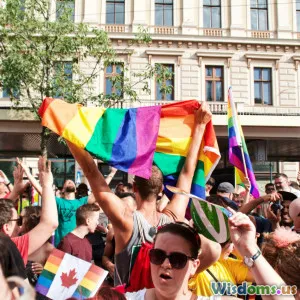
Building Trust After Betrayal in LGBTQ Plus Partnerships
9 min read Explore effective strategies to rebuild trust after betrayal in LGBTQ+ partnerships and foster healing, communication, and resilience within queer relationships. (0 Reviews)
Building Trust After Betrayal in LGBTQ+ Partnerships
Trust, once broken, feels almost impossible to rebuild — especially in LGBTQ+ relationships where the stakes often feel higher due to societal pressures and marginalization. Betrayal, whether it's infidelity, secrecy, or a breach of emotional boundaries, can shake the foundation of a queer partnership dramatically. Yet, healing and growth are achievable through intentional effort, open communication, and compassionate understanding.
This article delves into the sensitive journey of rebuilding trust after betrayal in LGBTQ+ partnerships, addressing the unique dynamics involved and offering practical steps toward repair and resilience.
Understanding the Unique Challenges LGBTQ+ Partnerships Face
LGBTQ+ couples often navigate challenges that compound the impact of betrayal. These include:
-
Social Stigma and Minority Stress: According to a 2019 study from the American Psychological Association, LGBTQ+ individuals experience higher rates of stress related to stigma, discrimination, and marginalization. This external pressure can cause partners to lean heavily on each other, meaning a betrayal may feel like an isolated breach in the only safe space.
-
Internalized Homophobia and Identity Struggles: These elements may make negotiating emotional pain even harder, as partners juggle both personal identity validations alongside relationship crises.
-
Less Social Support: Unlike heterosexual couples, many LGBTQ+ individuals may not receive family or community support, especially if they are not fully 'out.' This leads to isolated recovery from relationship betrayals.
Example:
Angela, a lesbian woman, described feeling “double-betrayed” when her girlfriend was unfaithful because not only was emotional trust broken, but it shattered her belief that her relationship was her safe haven from a largely unaccepting world.
Understanding these additional layers is critical before diving into the healing process.
Why Betrayal Hurts So Deeply in Queer Relationships
From infidelity to dishonest communication, betrayal violates the primary promise of safety and honesty. In LGBTQ+ relationships, where intimacy is often tied intricately to survival and identity validation, the impact may feel amplified.
Key aspects include:
-
Emotional Hyper-vigilance: Due to societal exclusion, queer individuals may be more alert to signs of relational harm, which can make betrayal feel intensely personal and traumatic.
-
Fear of Loss of Authentic Connection: Many LGBTQ+ people fight to be their true selves. Betrayal jeopardizes this authentic connection that many have fought hard to find.
-
Cultural Contexts: In communities where same-sex marriage and partnerships are recent developments, trust-building models may be less established, complicating the path forward.
Step 1: Creating Space for Honest, Open Communication
Rebuilding trust begins with authentic dialogue. This means:
-
Setting Intentional Times to Talk: Create a safe, distraction-free environment to address the breach.
-
Active Listening: Each partner should feel heard without judgment.
-
Expressing Feelings Transparently: Share hurt, fear, and hopes without minimizing.
David J. Schnarch, a renowned psychologist, emphasizes that “couples who survive betrayal don’t escape pain — they integrate it.”
Practical Tip: Use "I" statements instead of accusatory language. For instance, "I felt hurt when…" rather than "You did…" to prevent defensiveness.
Step 2: Understanding and Acknowledging the Betrayal Fully
The partner who caused betrayal must:
-
Own Their Actions Without Defensiveness: Accountability is vital.
-
Explain Motivations Honestly: While not excusing the act, understanding triggers helps.
-
Demonstrate Remorse Consistently: Genuine apology shows commitment to repair.
Example:
In a study by therapists focusing on queer relationships, couples where the offending partner openly discussed their mistakes without blame significantly improved chances of long-term reconciliation.
Step 3: Seeking External Support and Affirming Spaces
Many LGBTQ+ individuals experience less access to affirming relationship counseling, but:
-
Professional Therapy: Queer-affirming therapists skilled in trauma and betrayal recovery provide guided tools.
-
Peer Support Groups: Joining LGBTQ+ couples workshops or support circles grants validation and community learning.
-
Trusted Friends and Chosen Family: Allies who understand queer nuances can offer emotional scaffolding.
Stat Insight: According to the National Queer and Trans Therapists of Color Network, accessing queer-specific therapy improves outcomes for trauma and relational healing.
Step 4: Rebuilding Trust Through Consistent Actions
Rebuilding trust isn’t just talk — it’s repeated evidence over time:
-
Transparency: Sharing plans, schedules, or feelings to rebuild predictability.
-
Reliability: Consistently following through on promises, no matter how small.
-
Patience: Recognizing that trauma response timing varies.
-
Celebrating Progress: Acknowledge milestones, however incremental.
Example:
Ren and Kira, a bisexual couple, established nightly check-ins post-betrayal, fostering intimacy and transparency gradually that felt previously impossible.
Step 5: Exploring Forgiveness and New Relationship Norms
Forgiveness is neither obligation nor forgetting but a choice to release bitterness for personal peace. In LGBTQ+ partnerships:
-
Redefining Boundaries: Partners might create new boundaries to protect vulnerability.
-
Innovative Agreements: Some couples explore non-monogamy with clear communication as a healing avenue.
-
Growth Mindset: Viewing betrayal as a catalyst to build a stronger, more conscious partnership.
Bishop D. Wayne Crystal notes, True forgiveness transforms the betrayed and the betrayer by enlarging the heart and expanding love's capacity.
Addressing Intersectionality in Betrayal Recovery
It's vital to recognize overlapping identities in LGBTQ+ individuals affecting trust repair:
-
Race and Ethnicity: Cultural backgrounds shape approaches to conflict and healing.
-
Disability: Accessibility in therapy and communication styles matter.
-
Age and Generation: Younger versus older queer couples experience varying societal acceptance influencing perception and recovery.
Customized strategies respecting these intersecting identities enhance healing efficacy.
Conclusion: Embracing Vulnerability as Strength in Rebuilding
Betrayal undeniably wounds deeply, yet in LGBTQ+ partnerships, the process of rebuilding trust can transform a couple into a beacon of resilience, understanding, and authentic connection. The journey demands courage — a willingness to confront pain, embrace vulnerability, ask for help, and recommit to honesty.
Above all, recognizing that every partnership is unique encourages tailored approaches rather than rigid rules. Healing is possible, and many couples emerge stronger, celebrating love that has endured and evolved in true partnership.
Whether you are navigating such complexities now or supporting a loved one, the path to rebuilding trust after betrayal within LGBTQ+ partnerships is paved with empathy, intention, and hope.
References
- American Psychological Association (2019). "Stress in LGBTQ+ communities." Retrieved from https://www.apa.org
- National Queer and Trans Therapists of Color Network. "The impact of queer-affirming therapy." https://www.nqttcn.com
- Bishop D. Wayne Crystal, "The Forgiveness Factor," 2001
- David J. Schnarch, "Passionate Marriage," 1997
Rate the Post
User Reviews
Popular Posts




















